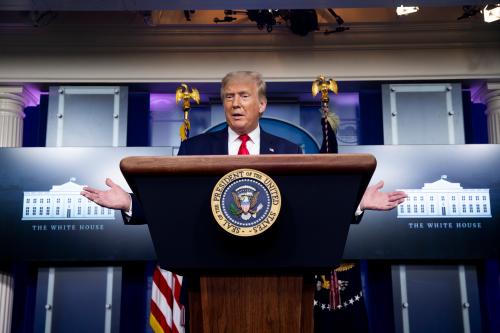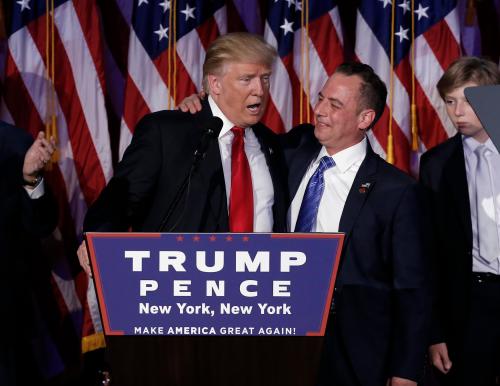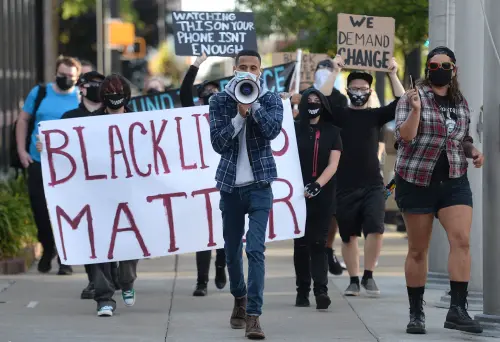The Brookings Cafeteria podcast last week discussed the role President Trump’s racist rhetoric has played in encouraging violence in America. Predictably, some podcast listeners responded skeptically on Twitter, doubting the association between Trump and hateful behavior. It would be naïve to think that data will change many individuals’ minds on this topic, but nonetheless, there is substantial evidence that Trump has encouraged racism and benefitted politically from it.
First, Donald Trump’s support in the 2016 campaign was clearly driven by racism, sexism, and xenophobia. While some observers have explained Trump’s success as a result of economic anxiety, the data demonstrate that anti-immigrant sentiment, racism, and sexism are much more strongly related to support for Trump. Trump’s much-discussed vote advantage with non-college-educated whites is misleading; when accounting for racism and sexism, the education gap among whites in the 2016 election returns to the typical levels of previous elections since 2000. Trump did not do especially well with non-college-educated whites, compared to other Republicans. He did especially well with white people who express sexist views about women and who deny racism exists.
Even more alarmingly, there is a clear correlation between Trump campaign events and incidents of prejudiced violence. FBI data show that since Trump’s election there has been an anomalous spike in hate crimes concentrated in counties where Trump won by larger margins. It was the second-largest uptick in hate crimes in the 25 years for which data are available, second only to the spike after September 11, 2001. Though hate crimes are typically most frequent in the summer, in 2016 they peaked in the fourth quarter (October-December). This new, higher rate of hate crimes continued throughout 2017.
The association between Trump and hate crimes is not limited to the election itself. Another study, based on data collected by the Anti-Defamation League, shows that counties that hosted a Trump campaign rally in 2016 saw hate crime rates more than double compared to similar counties that did not host a rally.
The data analysis discussed above has centered on correlations; they are suggestive of a link between Trump and racist attitudes and behavior, but do not actually demonstrate that one leads to the other. However, there is also causal evidence to point to. In experiments, being exposed to Trump’s rhetoric actually increases expressions of prejudice. In a 2017 survey, researchers randomly exposed some respondents to racist comments by the president, such as:
“When Mexico sends its people, they’re not sending their best. They’re sending people that have lots of problems… They’re bringing drugs. They’re bringing crime. They’re rapists. And some, I assume, are good people.”
Other respondents were exposed to a statement by Hillary Clinton condemning prejudiced Trump supporters. Later in the study, the respondents were asked their opinion of various groups, including Mexican people, black people, and young people. Those who had read Trump’s words were more likely to write derogatory things not only about Mexican people, but also about other groups as well. By contrast, those who were exposed to Clinton’s words were less likely to express offensive views towards Muslims. Words do matter, and data prove it.
Unfortunately, there is little reason to expect this research to have much impact on public attitudes; increasingly, partisanship skews what Americans think qualifies as racist. But there is no excuse for avoiding clear, accurate descriptions of American political dynamics. When the data show that President Trump’s support stems from racist and sexist beliefs, and that his election emboldened Americans to engage in racist behavior, it is the responsibility of social scientists and other political observers to say so.
The Brookings Institution is committed to quality, independence, and impact.
We are supported by a diverse array of funders. In line with our values and policies, each Brookings publication represents the sole views of its author(s).









Commentary
Trump and racism: What do the data say?
August 14, 2019